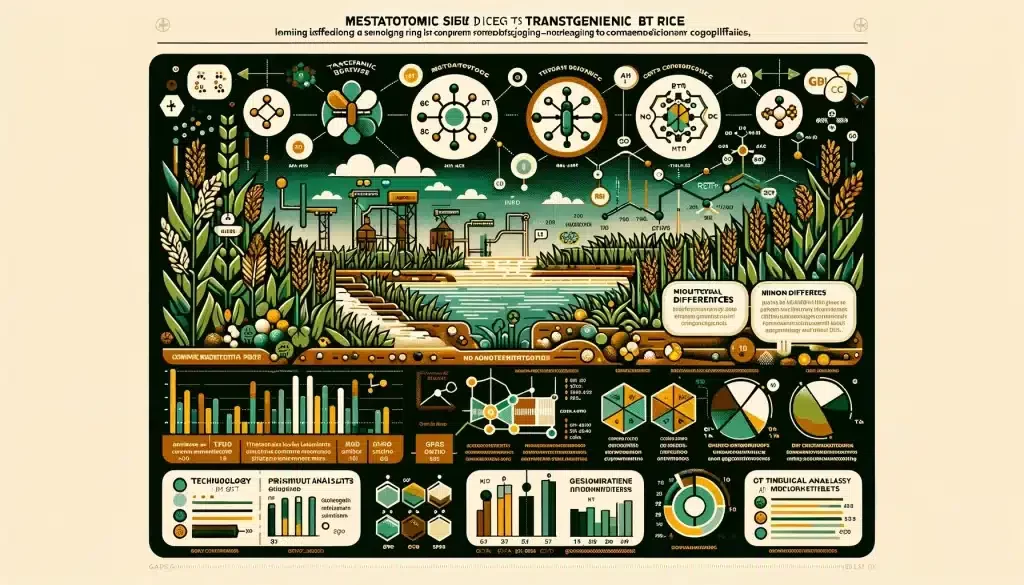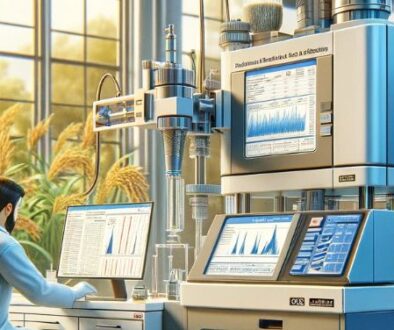Metabolomic Study Of Bt Transgenic Rice Based On Gc-Tof/Ms Technology
Comprehensive study shows minimal metabolic impact of Bt gene on rice, highlighting environmental influence over genetic modifications in transgenic crops.
Based on GC-TOF/MS technology, a metabolomic study was conducted on the transgenic Bt gene and its parent rice from two different origins. A total of 774 chromatographic peaks were detected from rice samples, and 278 metabolites were identified, including sugars, amino acids, fatty acids, organic acids and other metabolites. Principal component analysis was performed on the transgenic Bt gene and its parent rice. The results showed that there was no obvious difference between the metabolome of the transgenic Bt gene and its parent rice. Further partial least squares discriminant analysis and variance analysis were performed on the data. Only glycerol and mouse There are certain differences in the concentrations of two metabolites of plum sugar between Bt transgenic rice and its parent rice (increased by 1.55 and 3.32 times respectively); the effects of different origins on the rice metabolome were examined, and the results showed that the concentrations of the two origins in Wuhan and Hainan were There are obvious differences between rice metabolomes, and 15 metabolites change significantly between parent rice from different origins and between transgenic rice from different origins. GC-TOF/MS technology was used to conduct a comparative study on the metabolome of transgenic Bt rice and its parent rice from different origins. The results showed that the introduction of exogenous Bt genes did not have a significant impact on the metabolism of the rice in the experiment. The difference in metabolome between rice caused by the introduction of exogenous Bt gene is more significant than that caused by the introduction of exogenous Bt gene
Introduction to the Study
A pioneering study uses GC-TOF/MS technology for a detailed comparison between transgenic Bt rice and its non-transgenic parent, focusing on their metabolic profiles and the influence of geographic origins.
In a groundbreaking study employing Gas Chromatography-Time of Flight/Mass Spectrometry (GC-TOF/MS) technology, researchers have embarked on an in-depth metabolomic exploration comparing transgenic rice containing the Bacillus thuringiensis (Bt) gene with its non-transgenic counterparts, originating from distinct geographical locations. This analysis not only sheds light on the metabolic impacts of genetic modification but also offers insights into the variability induced by environmental factors on rice metabolomics.
Metabolite Detection and Identification
An extensive array of 774 chromatographic peaks and 278 metabolites, including a diverse range of biochemical compounds, were identified, establishing a foundation for understanding metabolic variations.
The study meticulously detected a total of 774 chromatographic peaks from the rice samples, leading to the identification of 278 distinct metabolites. These metabolites encompass a wide range of biochemical compounds, including but not limited to sugars, amino acids, fatty acids, and organic acids. Such a comprehensive metabolite profiling forms the cornerstone of understanding the subtle metabolic shifts that may arise from genetic modifications as well as environmental variances.
Principal Component Analysis (PCA) Results
PCA reveals no significant differences in the metabolomes of Bt-transgenic and non-transgenic rice, highlighting the metabolic equivalence of genetically modified crops.
Utilizing Principal Component Analysis (PCA), the research delves into the comparative metabolomic landscapes of Bt-transgenic rice and its parental strain. Remarkably, the PCA results unveil no significant metabolomic disparity between the genetically modified rice and its non-modified progenitor. This finding is pivotal, as it underscores the metabolic stability and equivalence of transgenic Bt rice when compared to its traditional counterpart.
Further Analytical Insights
Despite the overall metabolic similarity, slight increases in the concentrations of glycerol and mouse-ear cress sugar in Bt rice point to minimal metabolic adjustments due to the transgenic modification.
Further analytical rigor was applied through Partial Least Squares Discriminant Analysis (PLS-DA) and variance analysis, honing in on the detailed metabolomic distinctions. Notably, the study highlights minor concentration variances in two specific metabolites, glycerol and mouse-ear cress sugar, which were found to increase by 1.55 and 3.32 times, respectively, in Bt-transgenic rice compared to the parental strain. Despite these variations, the overall metabolic integrity of the rice remains largely unaffected by the introduction of the Bt gene.
Impact of Geographic Origin
The study also uncovers significant metabolomic variations between rice from different locations, suggesting that environmental factors play a more substantial role in metabolic diversity than genetic modifications.
In addition to genetic factors, the study also investigates the influence of geographic origin on the rice metabolome, comparing samples from Wuhan and Hainan. The analysis reveals significant metabolomic differences attributable to the origin, with 15 metabolites showing notable concentration shifts between the different locations, irrespective of the genetic modification. This aspect of the study emphasizes the substantial impact of environmental conditions on the metabolomic profile of rice, overshadowing the minimal metabolic changes induced by the Bt transgene.
Concluding Remarks
This research confirms the minimal impact of the Bt gene on rice metabolism and emphasizes the greater influence of environmental conditions on the metabolomic profile of rice, contributing valuable insights into the safety and metabolic implications of genetically modified crops.
In conclusion, this comprehensive metabolomic analysis leveraging GC-TOF/MS technology affirms that the introduction of the exogenous Bt gene into rice does not significantly alter the crop’s metabolome. The observed metabolic stability suggests that transgenic Bt rice maintains a metabolic profile closely aligned with that of its non-transgenic counterpart, thereby supporting the biosafety and equivalence of genetically modified crops. Moreover, the findings highlight the predominant role of environmental factors over genetic modifications in shaping the metabolomic diversity of rice. This study not only contributes to the ongoing discourse on the safety and impact of genetically modified organisms (GMOs) but also underscores the complexity of plant metabolomics influenced by genetic and environmental factors.
For futher details of this article and research, feel free to contact our team for assistance.
Original research was done by Wu Shengming, Xia Qing, Li Haijing, Sang Zhihong, Cheng Jianhua, Dong Fangting
About ETprotein:
ETprotein, a reputable plant protein vegan protein Chinese factory manufacturer and supplier, is renowned for producing, stocking, exporting, and delivering the highest quality organic bulk vegan protein and plant proteins. They include Organic rice protein, clear rice protein, pea protein, clear pea protein, oat protein, watermelon seed protein, pumpkin seed protein, sunflower seed protein, mung bean protein, peanut protein, various of plant peptides etc. Their offerings, characterized by a neutral taste, non-GMO, allergen-free attributes, cater to a diverse range of industries. They serve nutraceutical, pharmaceutical, cosmeceutical, veterinary, as well as food and beverage finished product distributors, traders, and manufacturers across Europe, USA, Canada, Australia, Thailand, Japan, Korea, Brazil, and Chile, among others.
ETprotein specialization includes exporting and delivering tailor-made protein powder and finished nutritional supplements. Their extensive product range covers sectors like Food and Beverage, Sports Nutrition, Weight Management, Dietary Supplements, Health and Wellness Products, and Infant Formula, ensuring comprehensive solutions to meet all your protein needs.
As a trusted company by leading global food and beverage brands and Fortune 500 companies, ETprotein reinforces China’s reputation in the global arena. For more information or to get a free sample of their protein products, please contact them and email sales(at)ETprotein.com today.












